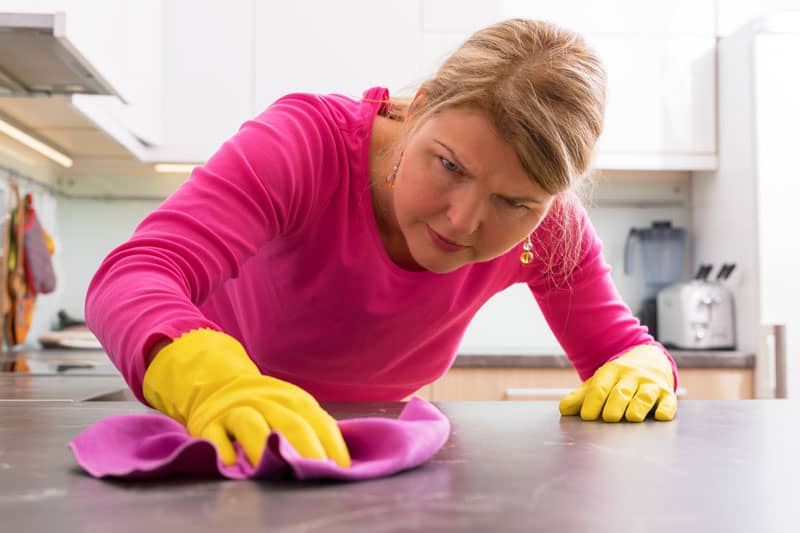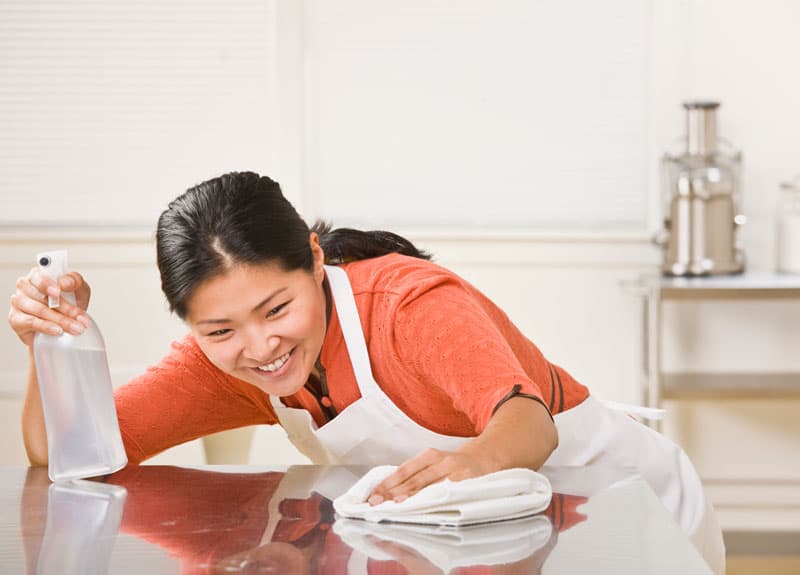Quartz countertop has risen so fast that it’s almost hard to believe it didn’t exist at some point. First produced in the 1960s, it is now one of the best countertop options for both residential and commercial use.
This is mainly because, unlike other natural stones, quartz possesses a higher resistance to stains and grime. However, this doesn’t mean that it can’t be stained. Like every other countertop, quartz remains susceptible to stains, including water stains. And if not managed properly, it can cause loss of beauty or worse irreversible damage to your quartz countertop. As such, you’ll need to remove hard water stains as soon as they accumulate.
In this article, we’ll provide some tips on how to remove water stains from quartz countertops. We’ll also explain a practical approach for the general maintenance of your quartz countertops.
What Causes Water Stains On Your Quartz Countertop?
Since quartz countertops are stain-resistant, you might be wondering how water stains still occur. Well, it’s quite straightforward.
First, while quartz is resistant to stain, it’s still not stain-proof. As such, items, including water, can even dye it.
Next, water stains are from mineral deposits like limescale and calcium that constitutes water. And this stain occurs when these minerals merge with your quartz after the liquid has evaporated.
It then keeps accumulating until it becomes visible and messes with your beautiful quartz countertop. Worse, the hard water may bond with some ordinary detergents and make it even more challenging to remove.
In case you’re not sure how a water stain appears, it usually comes in the form of a gray stain that won’t seem to go away. (These stains are also called hard water stains).
Removing Water Stain Tips From Your Quartz Countertops
1. Chip away the affected area
An excellent means to rid yourself of water stains is to scrape the limescale deposit on your quartz countertop with a plastic spatula. In case the stain is harder, you might try out a razor blade with a single edge.
However, you’ll need to be extremely careful to ensure you don’t end up doing more damage to your quartz’s surface.
As such, ensure you clear out the area, so you have enough space to work. Then, scrape slowly and deplete the accumulated limescale. You’ll still need to clean it afterward.
2. Use a steel wool
In case you need to remove a minimal mineral stockpile resulting from a spill of hard water, use a ball of steel wool. Dab the surface in a circular motion using the steel wool. Do this to the whole surface regardless of whether there’s a visible stain or not.
After this, use a dry cloth to deplete the loosened buildup on your countertops surface.
3. Use a poultice
Another effective way to rid your quartz countertop of water stains is to apply a poultice. Make one by mixing baking soda with water and dish soap.
After this, apply it to the surface in a circular motion with a kitchen sponge.
Then, wait for 15 to 20 minutes to lapse before removing with the use of cold water and a pad that doesn’t scratch. You should be free of the stain now.
However, you might need to do this multiple times to expel the stain thoroughly.
4. Use a plastic wrap
If you encounter a hard water stain that fails to bulge to the method above, try this method.
After pouring the poultice, instead of rubbing with a kitchen sponge, dress it using plastic wraps. After, wait for a few hours to allow the dressing to react with the stain.
Ideally, it will heat the area and take off the stain from your countertop. Then, you can use a kitchen sponge to clean up the area.
5. Use specialized cleanser
You can also try out cleaning materials specially designed to remove water stains from your quartz countertop. Generally, apply the cleanser to the affected area for 2 to 5 minutes.
After this, scrub in a circular pattern with a sponge that won’t result in scratches. Then, clean the surface with water.
Ensure you avoid chemicals with chlorine composition as they tend to damage quartz countertops. Also, ph-neutral cleansers won’t do the trick.
6. Clean spills as early as possible
Another practical way to avoid water stains is to clean spills as early as they occur. This way, they don’t have time to settle down and cause a stain on your countertop.
Hence, as soon as a spill occurs, use a dry textile to wipe it off.
7. Use distilled water
As already explained above, it is not water per se that causes stains. Instead, it’s the minerals inside them that result in a stain.
Luckily, infused waters are usually free of these stains-causing chemicals. As such, it will be wise to use distilled water close to your quartz countertop to prevent water stains.
With it, water spills are less likely to culminate in a stain on your countertop. Also, when cleaning, it might be better to use distilled water.
Other Maintenance Precautions for Quartz Countertops
Beyond removing water stains, you need to imbibe a maintenance culture if you intend to keep your quartz in the best condition. Here’s a list of things to do and things to avoid.
Things to avoid
- Although quartz countertops can resist heat temperatures that are less than 300 degrees, higher ones are bound to hurt your countertops. As such, avoid exposing your quartz countertops to heat regularly.
- Avoid cutting directly on your quartz countertops. Although quartz is resistant to scratches, constant exposure to one is likely to damage your quartz countertop eventually.
- Avoid using strong solvents and chemicals on the surface of your quartz countertop. Avoid items like inks, permanent markers, oil soaps, paint strippers made of methylene chloride, and bleach.
- Avoid placing your quartz countertops in an area that directly exposes it to sunlight. Doing so will destroy its luster over time.
- Avoid sitting, kneeling, or standing on your quartz countertop. These can cause your countertop to break.
- Do not apply water repellents or sealants to the surface of a quartz countertop. Unlike as with other natural stones, quartz doesn’t require them.
Things to do
- Use a mat or trivet under hot materials to maintain the beauty and sheen of your quartz countertop.
- Use a cutting board whenever you need to cut anything. This way, you can protect your countertop from scratches.
- Clean the surface of your quartz countertop regularly.
- Use indoor ladders to ensure you don’t have to climb on your quartz countertop.
Final Thoughts
Hard water stains make your quartz countertops less attractive. And while you can remove such stains, it may be challenging to do it, especially for hard stains.
As such, your best bet is usually to prevent them from accumulating. So, maintain a cleaning routine and ensure you clean up spills as soon as they occur.
RSK Marble & Granite is a trusted quartz countertop provider in the Boston area with over 15 years of experience. Let us know if you have any other questions to help protect your quartz countertop investment.
Contact us at 978-447-1001 or by filling out our contact us form here.



The poultice with plastic wrap worked like a charm. Thank you.